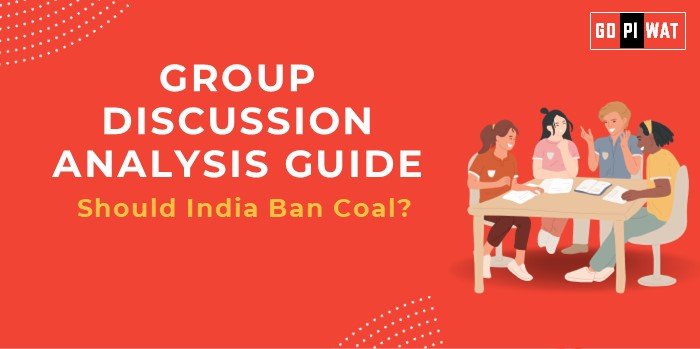📋 Group Discussion Analysis Guide: Should India Ban Coal?
🌐 Introduction to the Topic
Opening Context: India is the second-largest coal consumer in the world, and coal accounts for nearly 55% of its energy needs. In the wake of climate change and sustainability goals, the debate on banning coal has gained momentum globally and nationally.
Topic Background: The Paris Agreement, to which India is a signatory, mandates reductions in carbon emissions, pushing the transition from coal to renewable energy. However, India’s heavy reliance on coal for power generation complicates this shift.
📊 Quick Facts and Key Statistics
- Coal Contribution to Energy Mix: ~55% (2023) – Indicates dependency on coal for energy security.
- Renewable Energy Share: ~22% of installed capacity – Reflects progress but highlights the gap.
- Coal Employment: 1.5 million direct jobs – Underscores socioeconomic implications of a ban.
- Global Emissions Rank: 3rd largest emitter – Adds urgency to India’s energy transition.
🏗️ Stakeholders and Their Roles
- Government: Regulates energy policies and subsidizes renewables while managing coal production.
- Coal Industry: Largest domestic producer of coal and significant employment provider.
- Renewable Energy Companies: Advocating for green energy transitions and investment.
- Citizens: Impacted by coal-related pollution and potential job losses.
- Global Organizations: Pressuring India for climate commitments under COP agreements.
🏆 Achievements and Challenges
- Achievements:
- Renewable Growth: Installed renewable capacity of 175 GW (2023).
- Energy Access: Coal-based power electrified rural areas.
- Carbon Capture Projects: Emerging technologies like CCS being piloted.
- Challenges:
- Economic Dependence: Coal royalties form a significant part of state revenues.
- Technological Gaps: Limited efficiency in renewables compared to coal in grid stabilization.
- Global Comparisons: Countries like Germany have phased out coal but faced challenges in energy pricing.
- Case Study: Maharashtra’s Solar Microgrid Project – A successful transition model in rural areas.
🔑 Structured Arguments for Discussion
- Supporting Stance: “India must ban coal to fulfill its COP26 net-zero commitments by 2070.”
- Opposing Stance: “Banning coal prematurely will jeopardize energy security and millions of livelihoods.”
- Balanced Perspective: “A phased coal ban, complemented by renewable ramp-up and job transition plans, is essential.”
🗣️ Effective Discussion Approaches
- Opening Approaches:
- Statistical Impact: “India’s coal industry supports 55% of energy needs but contributes 40% of emissions.”
- Global Lens: “Countries like Sweden have successfully transitioned to renewables; can India replicate this?”
- Counter-Argument Handling: Propose alternatives such as transitional fuels (natural gas) and gradual job retraining programs.
📈 Strategic Analysis (SWOT)
- Strengths: Renewable potential, global climate leadership opportunities.
- Weaknesses: Socioeconomic reliance on coal, underdeveloped energy storage.
- Opportunities: Green hydrogen, international funding for energy transitions.
- Threats: Energy shortages, geopolitical tensions over critical renewable materials.
📚 Connecting with B-School Applications
- Real-World Applications:
- Energy finance, sustainability-focused operations management.
- Sample Interview Questions:
- “What is India’s biggest challenge in phasing out coal?”
- “How can private players accelerate India’s renewable energy transition?”
- Insights for B-School Students:
- Examine carbon credit mechanisms.
- Explore renewable energy supply chain models.


